WASHINGTON, DC
September 9, 2016
STRANGER: Larry Pressler
LOCATION: Peacock Cafe, 3251 Prospect Street NW, Washington, DC
THEME: Dining with a former U.S. senator
Larry Pressler is on a mission to save democracy.
The former Republican senator from South Dakota — now a politically independent private citizen — fears that negativity and money have poisoned Congress, weakening the political system by handing policy-making to un-elected bureaucrats and lobbyists. However Quixotic it might seem, he’s on a quest to inspire young people to get involved in civil service and restore hope to politics.
He’s eager to chat about the broken system and how to fix it — he’s even written a book on the topic. But during a two-hour dinner with Larry one Friday night in his adopted hometown of Washington, DC, I saw another side of him: A charming, talkative and down-to-earth 74-year-old who is still getting to grips with how to work email on his iPhone, who earlier that day saw a doctor about a sciatic nerve, and who would love to be out West indulging his hobby of reading cowboy poetry.
Put both these sides of the man together and you’ve got a stranger with one of the most distinguished careers from the people I’ve met, yet matched with one of the most humble personalities.
He’s endured the onslaught of negative political smear campaigns, his opponents spreading what he calls “bullshit” stories meant to undermine him. Like what he calls the lie about him getting stuck in a closet at a Senate hearing. However, he refuses to take digs at his critics, criticizing only their negative stories and focusing on positive politics.
He’s not naive, he’s just nice.
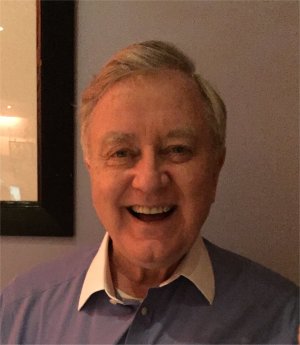
That friendly, optimistic approach worked for Larry during his decades in Congress, first as a representative in the House and then three terms in the Senate. He secured bipartisan backing for the Pressler amendment, which required Pakistan to certify that it has no nuclear weapons in order to receive foreign aid from the United States. He oversaw the passage of the 1996 telecommunications law that laid the groundwork for expanding the internet domestically. And he was called a hero for being the only lawmaker to outright reject a bribe in the 1970s-1980s Abscam scandal (he downplays the praise, saying he was just doing what any decent person would).
These days, Larry’s professional agenda includes writing, teaching at universities in the United States and abroad on the importance of democracy, and working on policy issues — everything from helping move a bill through the South Dakota legislature to help boost tribal representation to weighing in on an India-U.S. deal that has shades of the Pressler amendment. He never wants to retire, and that’s because he recognizes that getting people to be inspired by politics again is going to be a long slog. But he thinks it’s worth it.
“Politics is our only answer at the end of the day because it’s the way we get things done,” he told me minutes after we met at Georgetown’s Peacock Cafe. City councilors, county commissioners, members of Congress are all meant to make important decisions, he said. “People may despise them, but they’re the ones who have to get things done. It’s a very difficult thing to ask someone to run for office when there’s all this negative campaigning. But we have to work our way through it.”
Getting dinner with a stranger was yet another item on Larry’s to-do list.
Larry sometimes comes to the Peacock Cafe in the morning for their coffee (decaf, he’s a Mormon), but rarely for dinner. So it was something new for both of us to try the restaurant, which has a lively atmosphere, a flawlessly friendly staff from the bartender to the waiters, and a decent menu of pastas, salads and other fare.
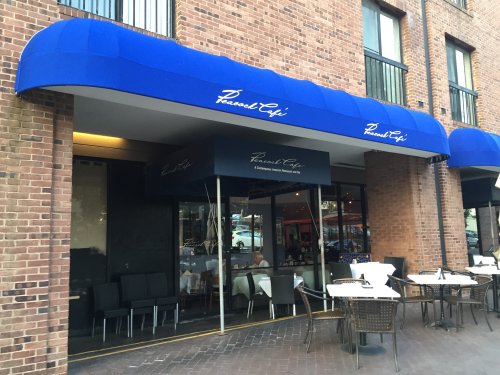
We were joined initially by his friend Janet Donovan, a longtime resident of the District whose contacts list includes a host of well-known names in politics. She’d seen my interview with journalist Eleanor Clift and thought I’d enjoy dining with Larry. She was right.
The three of us chatted before the meal, although most of it was taken up with Janet and Larry engaged in a back and forth about how to check messages in the junk email folder on his iPhone. I’d gone in to the dinner expecting a more formal meeting, something like the congenial but professional coffee break I had with former New York City Mayor Ed Koch several years ago. But Larry was totally at ease, joking that one day he’d conquer Steve Jobs’ invention.
After Janet left, Larry and I placed our orders for dinner. He then told me how he’s also trying to improve his skill at using a computer, in order to more easily write his speeches, books, and other work. For now, he primarily writes everything longhand and relies on paid assistants to help him out.
That day alone he’d been trying to figure out the best way to advertise for an assistant or two to help with putting together his book on the U.S.-India deal. When I asked him what else he’d been up to, his answer was refreshingly straightforward and honest. “Let’s see. I saw a pain doctor about a sciatic nerve in my back, he gave me a shot and some ibuprofen. Then I was on the phone in South Dakota for a ballot initiative to make it easier for independents to run in state elections. This afternoon I did a whole bunch of physical rehab, it’s a lot of exercises one leg over the other, almost like yoga. And you saw me dealing with my phone just now,” he said.
I couldn’t fault the honest, straightforward answer. Another politician with Larry’s years of experience might have a stock answer for “what kind of day has it been?” that tries to put them in the best light. Larry gave me a literal, unvarnished answer.
“When I first came to Washington, they said I was dull as vanilla,” Larry said. “But that’s my favorite ice cream flavor,” he added with a wink.

Larry didn’t want a starter, but I was feeling peckish so ordered the tomato bisque.
Beautifully presented with a pattern of cream on top, the soup tasted fresh and rich, just the right size to sate my appetite before the main course. Eating sidelined me from conversation, so in-between spoonfuls I asked Larry to elaborate on his quest to promote politics.
His book, “An Independent Mission To Save Our Democracy,” released earlier this year charts his entire life from growing up in South Dakota to his service in Vietnam, from his time as a Rhodes Scholar to his work with the Foreign Service in Switzerland, and from his terms in Congress to his post-political career. It’s a breezy, interesting read and Larry uses the anecdotes from his past to demonstrate the good and bad of politics, and the need to stay positive. The book ends with his solutions for a soured democracy, including: Electing more independent senators to hold the balance of power, overhaul campaign financing, and promoting civil service.
Although he served as a Republican while in the House and Senate, Larry now identifies as an independent. He voted for Barack Obama in 2008 and 2012 elections. He’s endorsed Hillary Clinton for this year’s presidential race. His former party has shifted so far to the right that he’s now seen as center-left, Larry said. It’s that lack of any party affiliation that makes him a good messenger. He’s not tied to promoting either the GOP or the Democratic parties; he’s promoting democracy.
And he’s not in it for the money. “Don’t ever try to make money out of books,” he laughed. “The best you can hope is to break even.”
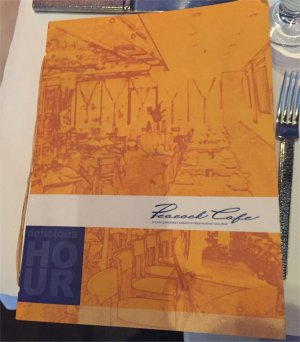
Couldn’t he have raked in bags of cash as a lobbyist once he left the Senate? Yes, he could have, but that didn’t interest him. He wanted to teach, to share his knowledge of politics with others. Gigs as a visiting professor around the States and other countries bring him a little extra income, he said. But he added, “I’m one former senator who’s not rich. I’ve got a pension and Social Security, but I did not want to become a lobbyist, so I don’t have the kind of money I would [have] liked to have put away.”
But he’s happy with his chosen path, enjoying engaging with younger people.
As might be expected with someone as earnest as Larry, he never had a passion to be a politician.
Born March 29, 1942, in Humboldt, South Dakota, Larry grew up on his family’s “humble” farm in Sioux Falls. His father, the operator of a small fertilizer business, instilled in Larry a sense of the importance of government, and so when he was of college age in 1964 he pursued a bachelor of arts in government at the University of South Dakota, Vermillion. He was also a Rhodes Scholar, getting a diploma in public and social administration at Oxford University.
After graduation from university, he volunteered to fight in the Vietnam War.. I suggested this was a brave move, but he said, “I don’t know if it was, it didn’t matter, because my father believed very strongly that every young man had an obligation to serve, so I volunteered.”
In Vietnam, he served two tours of combat duty as a second lieutenant from 1966 to 1968. His base didn’t see much heavy conflict, he said, but snipers were always a concern. Serving for 18 months taught him to become opposed to sending American troops overseas. “I became very much against boots on the ground. Throughout my political career I never met a single person who served in Vietnam who believed we should be invading countries. I find most people in favor have never served,” he said. “If you’ve served in a war you become awfully doubtful about sending Americans into a foreign country to fight.”
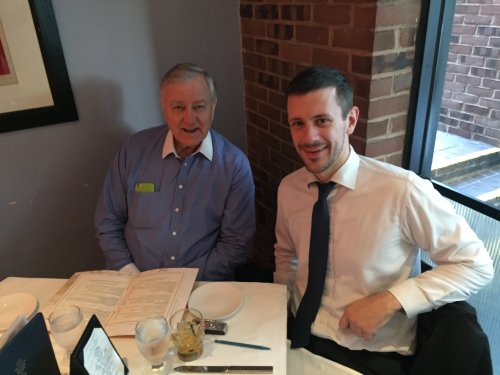
After the Army, Larry knew he wanted to stay in public service — and in particular the Foreign Service. “I thought that having a law degree would help,” he said, so he went to Harvard Law School and got his Juris Doctor in 1971. Sure enough he ended up as a Foreign Service officer, working from 1971 to 1974 in the District and Geneva, Switzerland on trade and tariff legal issues.
Larry said he enjoyed the work but in 1974 he had to go back to South Dakota to take care of his ailing father, who was starting to show the symptoms of Alzheimer’s. He helped his mother out on their farm and at the fertilizer business for a while, but soon enough he’d wind up in politics.
That same year the South Dakota GOP was struggling to find people to run for Congress in what was then a Democratic state. One of Larry’s professors from the University of South Dakota, Dr. William Farber, encouraged his former student to run, and to run an idealistic campaign.
Why was Larry a Republican? Three reasons, he said. “One, the Republicans were much more about promoting individual achievement. Two, at that time the Democratic Party was much more protectionist on trade, but my experience in Geneva had made me a free trader. The third was civil rights — I went to the second march on Selma, I was very interested in civil rights. In those days the Democratic Party was much more hesitant on civil rights, that’s because they wanted to carry the South and the presidency.”
Larry won the GOP primary, ran in the general election, he stayed idealistic, and he won.
Before I could quiz him about his life as a lawmaker, our entrees arrived.

Larry had asked the waiter if he could put together a salad with fish, and what arrived was a beautiful-looking cut of grilled salmon atop a bed of greens. I didn’t try any, but it looked great.

I had the rigatoni pasta with grilled chicken, in a rosé sauce of braised tomatoes, cream and basil. It was a very heavy dish, about four or five forkfuls and I was feeling full despite hardly making a dent. But it was a good one, a slightly tangy sauce coating the perfectly cooked pasta.
As we ate, I shifted the focus back to Larry’s entry to Congress, and his service in the House from 1975 to 1979. In the lower chamber he focused on labor and education issues, including work on issues for the elderly such as funding meals on wheels. Then one of South Dakota’s two Senate seats opened up.
Professor Farber again encouraged him to run for the Senate seat — and again he won with his unique brand of positive politics. The fact there were just 100 senators compared to 435 representatives was appealing for his agenda. “In the Senate, I could work on very similar issues as in the House, but have more a chance to highlight them and to get legislation passed,” he said.
Larry served in the Senate from 1979 to 1997, and was among the lawmakers targeted in the late 1970s and early 1980s Abscam scandal. The FBI tried a sting operation seeing if members of Congress would take bribes in return for political favors. Several were convicted, but Larry said, “Wait a minute, what you are suggesting may be illegal,” and immediately reported the bribe to the FBI. Walter Cronkite called him a hero, but Larry reiterated to me that he was just doing what most regular Americans would have done.
“Most citizens care about their country, most citizens in this restaurant would not take a bribe,” he said, looking around the dining room.

I pointed out that statistically, under Abscam about a third of the restaurant would have taken a bribe, and asked him how he felt when his fellow lawmakers were discovered. “I was very disappointed,” he said. “I don’t like to make judgments but — yes, disappointed.”
Larry enjoyed serving in the Senate, but his 1996 reelection bid would prove to be his toughest. By then the chairman of the Commerce, Science and Transportation Committee, Larry was a top target for Democrats. He faced a barrage of negative ads and false stories being spread in the press, designed to undermine him. For example, there was a story that he left a Senate hearing and walked into a closet, and stayed there for 15 minutes. To an observer it’s funny but obviously aimed at making the character look like a clown. It irritated Larry, because it was the kind of story that’s impossible to disprove.
“I had one of my guys look into it,” he said. “They couldn’t find anybody who had seen this. Someone said it was a Foreign Relations Committee hearing. Well, there are no closets in that committee room for security reasons. Someone said it happened three weeks ago, but three weeks ago I was out of the country. You can never trace it back, and you look like a fool trying to deny it,” he added with a sigh of frustration.
The final election result was close, but Larry lost 49% to Democrat Tim Johnson’s 51%.
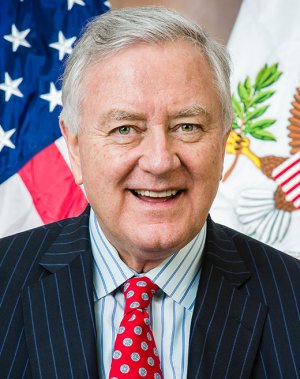
After being defeated for reelection, Larry developed what he calls his “niche” career as a tutor.
He tried a comeback in 2014, running as independent in South Dakota’s Senate race. Why put himself through the mudslinging again? “I felt the relationship between Republicans and Democrats had become poisonous, and that if we could just get five independents elected we could make a lot of change. We could maybe break some of that poisonous atmosphere by working with both parties,” he said.
Unfortunately running as an independent meant attacks from left and right this time, including anti-Pressler ads by the Koch Brothers and a piece on Rachel Maddow’s MSNBC show where she quoted from a print story that in turn quoted “Capitol Hill lore” about his alleged committee room closet mix-up.
The attacks from both sides and the difficulties of winning election without party affiliation meant that on election night he fell far short of victory with 17% of the vote. He said he’s done running for office now.
I was still amazed that he manages to be so relentlessly positive despite facing years of negative attacks. I told him it was very refreshing he hadn’t spoken ill of anyone all night.
“They speak ill of me,” he said. But he praised his wife and daughter in providing the support to ignore the “mean-spirited” smear campaigns, and said that he’s happy with his life today.
I was happy he’d agreed to meet me, as it was an enjoyable dinner. Neither of us wanted dessert, so instead we finished off with drinks — a decaf coffee for him, a coffee spiked with mint liquor for me.

Washington, DC, serves as a good home-base for Larry to teach, study, and travel. He said he’d love to be back in South Dakota more often than the once or twice a month he’s there. But he noted his wife would like to move to Newburyport in Massachusetts to be closer to their grandchildren.
For now, his days are packed with writing, touring giving speeches and teaching, and indulging his passion: Reading cowboy poetry, which is prose about life in the West. His book on saving democracy includes a few samples of such poems, including these lines from “Take Care of Yer Friends” by Baxter Black:
A hug or a shake or whatever feels right
It’s a highpoint of giving, I’ll tell you tonight
All worldly riches and tributes of men
Can’t hold a candle to the worth of a friend
As Larry tells it in the book, “Why can’t Republicans have friends who are Democrats? That’s how you get things done in Washington. So many politicians have forgotten that fundamental truth.”
As dinner drew to a close, I went for a simple final question: What are the best and worst things he remembers about life in Congress?
He said the passage of the Telecommunications Act in 1996 was the best. “I was virtually responsible for that. It sounds like a lot of gobbledygook, and it took six years to pass, but we would not have internet as we have it today without it.” The law deregulated the broadcasting industry and included the internet in the sector for the first time. “Al Gore took all the credit for it, but I don’t mind,” Larry said with a smile. “It was a hard slog, but it’s good legislation.”
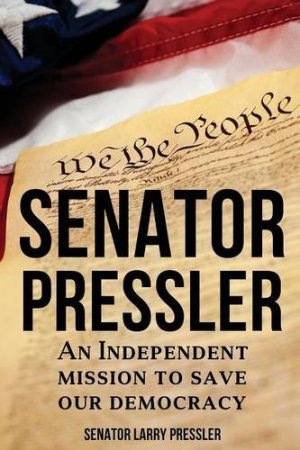
The worst? I thought he might say the negative campaigning he suffered. But for Larry, it all comes back to his fears about the weakening of democracy. He chastised the millions of dollars spent by lobbying firms to influence the writing of laws, and of the growing reliance on the administrative branch to implement policies through unelected rule-writers given deadlock in Congress. “It’s not transparent, the public doesn’t even know what’s going on,” he said.
“The solution is to end the apathy of the public. The problem is that the public will take negative ads, listen to all this garbage, and the press feeds on it. We need to have an age of enlightenment where we appreciate how important public service is,” Larry added. “And people have to work much harder preparing to vote. They need to get the facts on who they’re voting for, not just vote for the sake of voting.”
After a life in Congress that would leave others disillusioned, Larry stays upbeat, still hopeful that he can inspire a few people to bring civics back to civil service.
Our meal had inspired me to look up some cowboy poetry once I got home. I thought of some of the things Larry had said: That he could have made a fortune, but chose to teach. That he remains positive, despite the negativity of politics. And that his optimism about the future of the country endures. And then, a verse in “The Ranchman’s Song” by Larry Chittenden struck me:
Better live rich at heart on a crust in a garret,
Than languish in mansions impoverished with strife;
There is joy in a dugout, if fancy but share it
With hope and fond memory to brighten thy life.
v63v6i
jz8l4f
t6ihwp